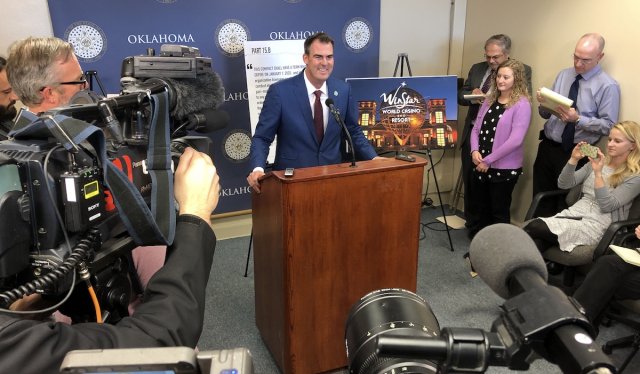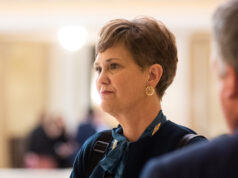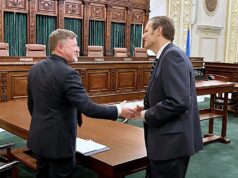

With all parties agreeing the issue could head to court if compromise is not found, Oklahoma Gov. Kevin Stitt and tribal representatives held dueling press conferences about gaming negotiations this afternoon at the State Capitol.
Stitt spoke first inside, saying his representatives were “kicked out” of an Oct. 28 state-tribal meeting before they could present a “plan” for new gaming compacts. Matthew Morgan, chairman of the Oklahoma Indian Gaming Association, spoke second outside, taking umbrage with the governor’s characterization of the issue.
“We are very confident that all the triggers of Part 15 (of the Oklahoma Model Tribal Gaming Compact) for automatic renewal have been met and that on Jan. 1 the compacts will roll over,” Morgan said.
Flanked by graphs and a quote from the model compact, Stitt offered a different interpretation.
“This compact was signed 15 years ago, and the fact is it expires on Jan. 1, 2020,” Stitt said. “This is going to cause extreme uncertainty if we don’t have a new compact by 2020.”
In essence, that sums up the two positions staked out over the past four months, though details are more convoluted and competing media campaigns have been more hyperbolic. But Thursday, speaking to packed media scrums, both Stitt and tribal gaming representatives had stern words.
“This has nothing to do with the tribes. This is about the casino industry,” Stitt said.
Morgan took issue with Stitt’s assertion.
“You cannot separate the two,” Morgan said. “There is no ‘commercial’ gaming. We do tribal-governmental gaming. It is all tribal, and it all reports back to our elected leadership. You can’t disengage one from the other.”
Morgan had no copyright on the day’s frustration, however. Stitt told reporters he was disappointed by the results of an Oct. 28 gathering where Oklahoma Attorney General Mike Hunter met with tribal leaders in Shawnee to discuss the issue.
“We were asked to talk about arbitration. We were asked to present our plan. And the state was kicked out of that meeting before we could present our plan,” Stitt said. “They would not listen to our plan. And then two or three days later, we got a subsequent letter that says arbitration is off the table with no other resolution for how to get past this.”
Morgan and Stephen Greetham, legal counsel for the Chickasaw Nation, both balked at the statement.
“His characterization was not accurate,” said Greetham, who attended the Oct. 28 meeting.

Stitt: ‘The fact is they have refused to communicate with me’
Greetham said he has already prepared legal briefs for multiple scenarios should common ground not be found.
“The tribes have a fiduciary responsibility to their citizens,” Greetham said.
Stitt said he has a similar responsibility to 4 million Oklahomans, tribal citizens or not.
“First off, I value the tribes. I am a member of the Cherokee Nation,” Stitt said. “I am so proud of my Native American heritage. I am so proud of the heritage we have in Oklahoma for our tribes.”
Asked if he could speak to the differences in perspective he may have from other citizens of the Cherokee Nation, Stitt said he disagreed with the wording of the question.
“My Cherokee card is the same as the 130,000 other Cherokee citizens across our country,” Stitt said, moments after admitting difficulty in pronouncing the United Keetoowah Band of Cherokee Indians.
RELATED
From sovereignty to sportsbook: Gaming negotiations affect ‘shared citizenry’ by Tres Savage
Stitt declined to discuss the specifics of the state’s plan that was unable to be presented Oct. 28, but he did note the potential for sportsbook in Oklahoma and a desire to seek higher exclusivity fees.
Greetham and Morgan noted that any hike in exclusivity fees would be federally required to represent greater concessions from the state to tribes. Greetham said Stitt’s claims about exclusivity fees were less than accurate, and Morgan took issue with how the governor characterized the views of the public.
“I understand as myself as a citizen of the Chickasaw Nation, as a citizen of the state of Oklahoma, as a citizen of the United States, how I view this situation,” Morgan said. “I can tell you I am one of the 4 million citizens he talks about, and his point of view does not represent me.”
Stitt, however, referenced past letters from tribal leaders that indicated an opinion that the compacts will not renew automatically on Jan. 1.
Asked what he makes of those letters years later, Greetham was cautious.
“I’ve worked in Indian country long enough to never say another tribal leader is wrong,” Greetham said. “Regardless of whatever position was articulated to the prior administration, no tribe is saying that right now. And the tribe I work for has never taken that position, nor has the majority of the tribes that are out there.”
Asked if the tribal leaders Stitt referenced have now changed their interpretation of whether the compacts expire, Greetham replied: “Yes. The letters were sent.”
Stitt said he still believes there is time for all parties to get on the same page and strike an agreement that works in everyone’s favor.
“The fact is, they have refused to communicate with me,” Stitt said. “That’s why I’m going directly to the Oklahoma people to let them know what is happening.”
Background on gaming negotiations
Stitt announced his desire to open gaming negotiations with an infamous July 8 opinion piece in the Tulsa World and a July 5 letter to tribal leaders. Both epistles frustrated tribal leaders, with chiefs responding with a letter of their own that staked out a competing interpretation of the compacts: They renew automatically unless tribes also want to open them for negotiation.
(Editor’s note: The organization United for Oklahoma supports the tribes’ position on gaming negotiations and purchased advertising on NonDoc in 2019.)





















